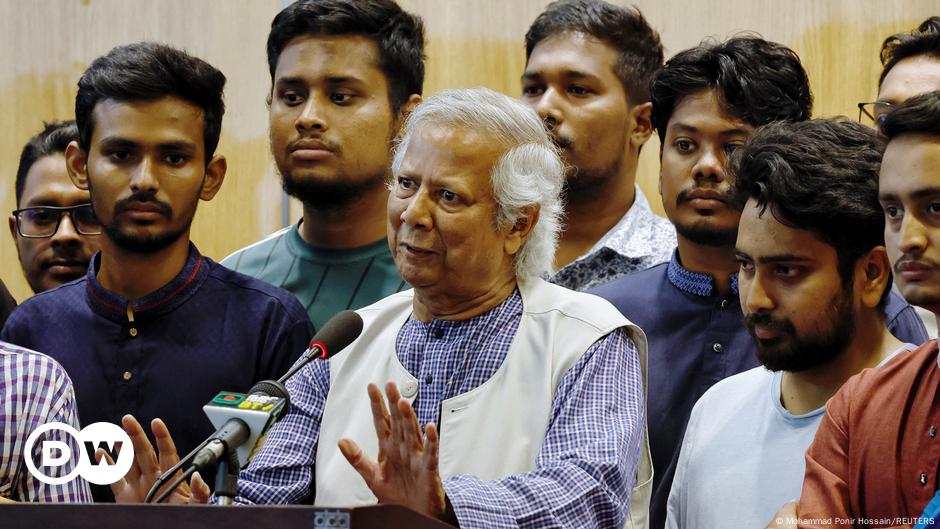After Bangladesh’s former Prime Minister Sheikh Hasina stepped down and fled the country on August 5 following massive nationwide protests, an interim government was established, led by Nobel Peace Prize laureate Muhammad Yunus.
The primary mandate of Bangladesh’s interim government is to ensure free and fair elections. Chief advisor Yunus’ office has said a free and fair election will take place as soon as reforms are made in the election commission, judiciary, civil administration, and security forces.
In a televised address on August 25, Yunus said the interim government has begun taking “corrective measures” to ensure state institutions regain public trust.
Bangladesh’s student-led protest movement considers most of the country’s institutions set up by Hasina and her Awami League government over their 15 years of power to be rife with corruption.
Bangladesh’s political opposition has also faced crackdowns, which led to the main opposition Bangladesh Nationalist Party (BNP), boycotting the latest election on January 7, during which Hasina ran virtually unopposed.
The protest movement that eventually led to Hasina’s downfall was sparked by discontent over a government job quota scheme that the young protesters said cut them off from lucrative jobs.
Reforming Bangladesh’s institutions is therefore a massive task for the interim government. However, it has not yet come up with any outline of reforms, according to the chief advisor’s office.
M Sakhawat Hossain, who served as home advisor to the interim government for three days, told DW that structural reforms are underway, although no details have been made public.
“It’s too early to speculate as to exactly what reforms this interim government will implement,” Hossain said.
Interim government needs an ‘identity’
Interim governments in Bangladesh are comprised of “advisors” and cannot pass laws by themselves, but rather will issue “ordinances” that may or may not be ratified into law by an elected government.
However, the interim government’s de-facto leadership role has many political implications as a potential blueprint for a future elected government.
Shafi Md Mostofa, an associate professor at the University of Dhaka and a visiting fellow at the London School of Economics, told DW that if the interim government does not define itself, for example through reform proposals, it could soon face a crisis of legitimacy.
“It can choose to define itself as an interim neutral government, or as a revolutionary interim government,” he explained.
“The interim government’s mandate is to hold elections only. However, if this government considers itself to be revolutionary, then a delay in holding polls should not be a concern,” he added.
Rumeen Farhana, former member of parliament and central international affairs secretary of the Bangladesh Nationalist Party (BNP) told DW that this interim government differs from previous caretaker governments.
“It has come to power as an outcome of a revolution. We had a dream of Bangladesh, free from all types of discrimination, and this government was formed out of that desire. The BNP will support this government if it maintains its commitment to democracy,” she said.
Sultan Mahmud Sharif, director of the UK Awami League, told DW that as this interim government is not elected and cannot reflect public demand, it has already brought in a lot of “chaos.”
However, Andaleeve Rahman, chairman of the Bangladesh Jatiya Party (BJP), told DW that there is no chance of prolonged chaos as the interim government remains committed to the restoration of democracy.
Taking time for consensus on reforms?
Kazi Firoz Rashid, a politician with the conservative Jatiya Party, told DW that any reforms proposed by the interim government must be approved by a future democratically elected government in order for the reforms to be sustained.
He said the consensus of all political parties is therefore vital to these reforms being undertaken, and the interim government “may be given a reasonable time for holding the election.”
Geoffrey Macdonald, visiting expert at the United States Institute of Peace, wrote in a recent article that in the past, measures by interim governments have consistently been either fully or partially undone by the following democratically elected government
“Moving too quickly toward polls would likely only empower existing and entrenched political actors that have fewer incentives to pursue structural reforms,” Macdonald writes.
In talks forming the interim government after the departure of Hasina, Bangladesh’s army chief, General Waker-Uz-Zaman met with the BNP, Jatiya Party and the Islamist Jamaat-e-Islami. There was no representation from Bangladesh Awami League in that meeting.
Sabbir Ahmed, a professor of political science at the University of Dhaka, told DW that any reforms would not be sustainable if they are not “implemented with agreement of all the political parties.”
He added that the reforms brought by Bangladesh’s last caretaker government backed by the military in 2007 “were all erased.”
Edited by: Wesley Rahn

